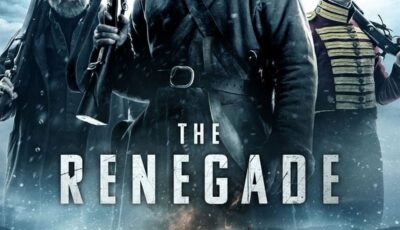The Renegade (or Black 47) is the title of an Irish-Luxembourg film released in 2018. Directed by Lance Daly, the film is set during the Great Irish Famine, in 1847, one of the harshest years of the period. The film is a kind of outlet, in which an Irishman returns from the war on the side of the British to assess the appalling situation in Ireland. Soon, he decides to take revenge… making the highest English dignitaries tremble…

The Renegade
We’re in Connemara, Ireland, in the winter of 1847. The Famine affected the whole of Ireland, and the British seemed to be taking advantage of the situation to expropriate the poor and export the only food available to England.
Ranger Martin Feeney is a deserter who decides to return to Ireland, after many years spent fighting in the World for the English army. He returned to Connemara to find his family and take them to America.
But his findings were chilling: he discovered a desolate Ireland, plunged into horrifying poverty and misery. Disease and hunger are everywhere. Martin learns of his mother’s death a year earlier: she refused to accept the soup offered by the British.
He also learns of the death of his brother, who was hanged for stealing food for his family.
Finally, he finds a few members of his family: a wife and children, whom he decides to take with him… But he watches helplessly as they are expropriated and die.
For Martin Feeney, it’s all too much: a fine soldier, he decides to take up arms and avenge his family. Judge, governor of the region: all will tremble in the face of the Irishman’s cold, impassive violence…
The pitch may seem a little light, even a little easy… It’s like those eternal American movies, where a man loses his loved ones and decides to take justice into his own hands… And bloodshed is usually the order of the day.
The prism is somewhat different with The Renegade: director Lance Daly sets his film in a historical context. He depicts a moribund Ireland, devastated by the blight that has rendered potatoes unfit for consumption. He depicts scenes of great cruelty: we soon realize that the British probably “let it happen”, leaving the Irish to starve, as if it were a calculated act.
To support this, the film portrays the British as haughty individuals, convinced of their superiority… and especially of the supposed inferiority of the Irish. The Irish population is dehumanized: hunger, disease and misery don’t matter. The British seem to be coldly exploiting these weaknesses in order to expropriate more and more, and gain ground. Worse still: to make sure the Irish can’t stay at home, they knowingly destroy their roofs, plunging them into the cold of a harsh, snowy winter, which leads inexorably to death.
But the film is not as Manichean as it seems: it also presents the case of the Irish who chose to collaborate with the British. Choices made for a variety of reasons, from survival to pure and simple adherence to the values preached by the government in power.
We also see a British man, who, horrified by the misery of the Irish, takes their side… The latter was unfortunately shot dead by the British following this engagement.
Scenes that make the situation a little more complex, and show that the British aren’t the only ones with a bad attitude.
Be that as it may, The Renegade is a rather good film, which plays the empathy and indignation card. It’s infuriating to see the British taking advantage of the situation. The scenes of cruelty follow one another until they justify Martin Feeney’s acts of vengeance. Very quickly, the murders (rather sober, and without excessive hemoglobin) become an outlet for the main character.
Nevertheless, we’re left a little disappointed, as Martin Feeney’s psychological depth is limited. Very silent, this hero seems to be a cold, implacable killing machine. A little more depth would have been appreciated.
Nevertheless, The Renegade is a good film, described by many as“Ireland’s Django Unchained“, which will enable you to learn more about the terrible period of the Irish Famine. We shudder at the horror of every scene. It’s a great way to consolidate your knowledge of history, while mixing fiction with an outlet.